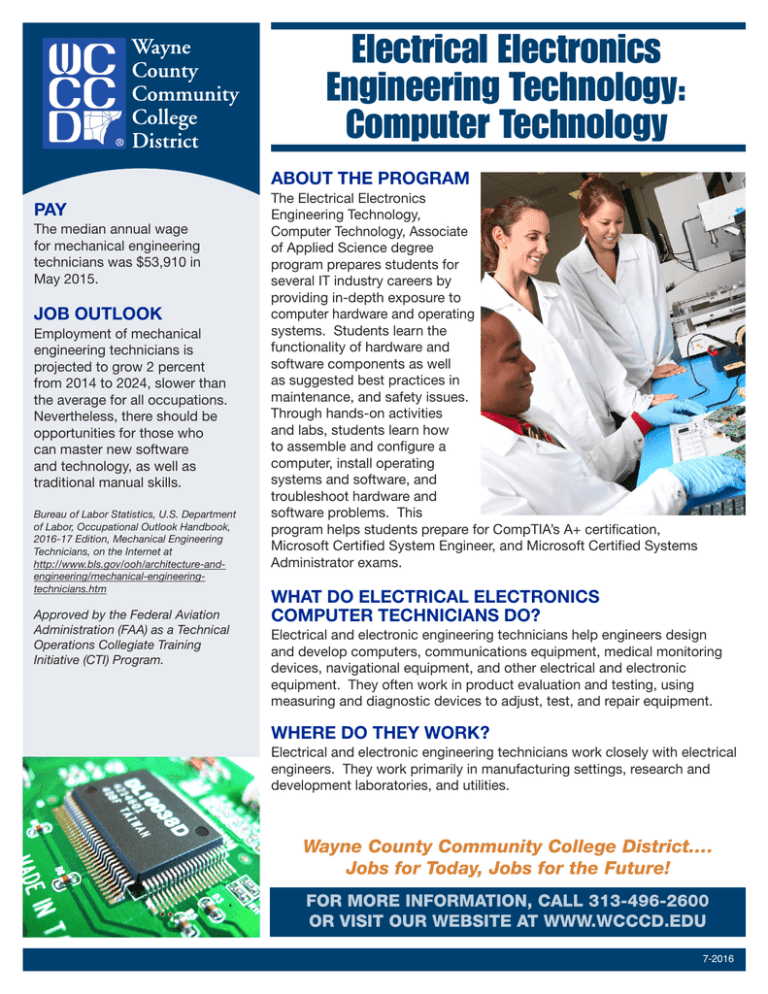Electrical Electronics Engineering Technology: Computer Technology
advertisement

Electrical Electronics Engineering Technology: Computer Technology ABOUT THE PROGRAM PAY The median annual wage for mechanical engineering technicians was $53,910 in May 2015. JOB OUTLOOK Employment of mechanical engineering technicians is projected to grow 2 percent from 2014 to 2024, slower than the average for all occupations. Nevertheless, there should be opportunities for those who can master new software and technology, as well as traditional manual skills. Bureau of Labor Statistics, U.S. Department of Labor, Occupational Outlook Handbook, 2016-17 Edition, Mechanical Engineering Technicians, on the Internet at http://www.bls.gov/ooh/architecture-andengineering/mechanical-engineeringtechnicians.htm Approved by the Federal Aviation Administration (FAA) as a Technical Operations Collegiate Training Initiative (CTI) Program. The Electrical Electronics Engineering Technology, Computer Technology, Associate of Applied Science degree program prepares students for several IT industry careers by providing in-depth exposure to computer hardware and operating systems. Students learn the functionality of hardware and software components as well as suggested best practices in maintenance, and safety issues. Through hands-on activities and labs, students learn how to assemble and configure a computer, install operating systems and software, and troubleshoot hardware and software problems. This program helps students prepare for CompTIA’s A+ certification, Microsoft Certified System Engineer, and Microsoft Certified Systems Administrator exams. WHAT DO ELECTRICAL ELECTRONICS COMPUTER TECHNICIANS DO? Electrical and electronic engineering technicians help engineers design and develop computers, communications equipment, medical monitoring devices, navigational equipment, and other electrical and electronic equipment. They often work in product evaluation and testing, using measuring and diagnostic devices to adjust, test, and repair equipment. WHERE DO THEY WORK? Electrical and electronic engineering technicians work closely with electrical engineers. They work primarily in manufacturing settings, research and development laboratories, and utilities. Wayne County Community College District…. Jobs for Today, Jobs for the Future! 7-2016 Recommended Sequence of Courses Electrical Electronics Engineering Technology: Computer Technology Associate of Applied Science (A.A.S.) CR. No. COURSE TITLE CREDITS SEMESTER 1 CT 203 Digital Logic I . . . . . . . . . . . . . . . .4 EE 101 Circuit Analysis I . . . . . . . . . . . . .4 EE 105 Electronics Fabrication and Design . . . . . . . . . . . . . . . . . . . . . .2 EE 107 Mathematics for Electrical/ Electronics I . . . . . . . . . . . . . . . . .4 ENG 119 English I . . . . . . . . . . . . . . . . . . . .3 SEMESTER TOTAL . . . . . . . . . . . . . . . . . .17 SEMESTER 2 CT 205 Introduction to Microprocessors . .4 EE 102 Alternate Current Fundamentals . .4 EE 115 Mathematics for Electrical/ Electronics II . . . . . . . . . . . . . . . . .4 EE 111 Solid State Fundamentals . . . . . . .3 SEMESTER TOTAL . . . . . . . . . . . . . . . . .15 SEMESTER 3 CT 207 Digital Logic II . . . . . . . . . . . . . . .3 CT 209 Computer Repair I CompTIA A+ . . . . . . . . . . . . . . . .4 TCM 200 Introduction to Telecommunications . . . . . . . . . . .3 ENG 134 Technical Communications . . . . .3 SEMESTER TOTAL . . . . . . . . . . . . . . . . . .13 SEMESTER 4 CT 211 Computer Networking I . . . . . . . .4 EE 205 Linear Integrated Circuits . . . . . . .2 Elective: Natural Science Elective . . . . . . . .3 PS 101 American Government . . . . . . . . .3 SEMESTER TOTAL . . . . . . . . . . . . . . . . . .12 SEMESTER 5 CT 213 Computer Networking II . . . . . . .4 PHY 235 General Physics I . . . . . . . . . . . . . .4 SEMESTER TOTAL . . . . . . . . . . . . . . . . . . .8 EEE: COMPUTER TECHNOLOGY PROGRAM TOTAL . . . . . . . . . . . . . . . . .65 Note: Program total hours may not include prerequisites. It is the policy of WCCCD that no person, on the basis of race, color, religion, national origin, age, sex, height, weight, marital status, disability, or political affiliation or belief, shall be discriminated against, excluded from participation in, denied the benefits of, or otherwise be subjected to discrimination in employment or in any program or activity for which it is responsible or for which it receives financial assistance from the U.S. Department of Education. This document is for informational use only and does not constitute a contract. WCCCD reserves the right to add or delete, without notice, any course offering or information contained in this document. 2/19/07


